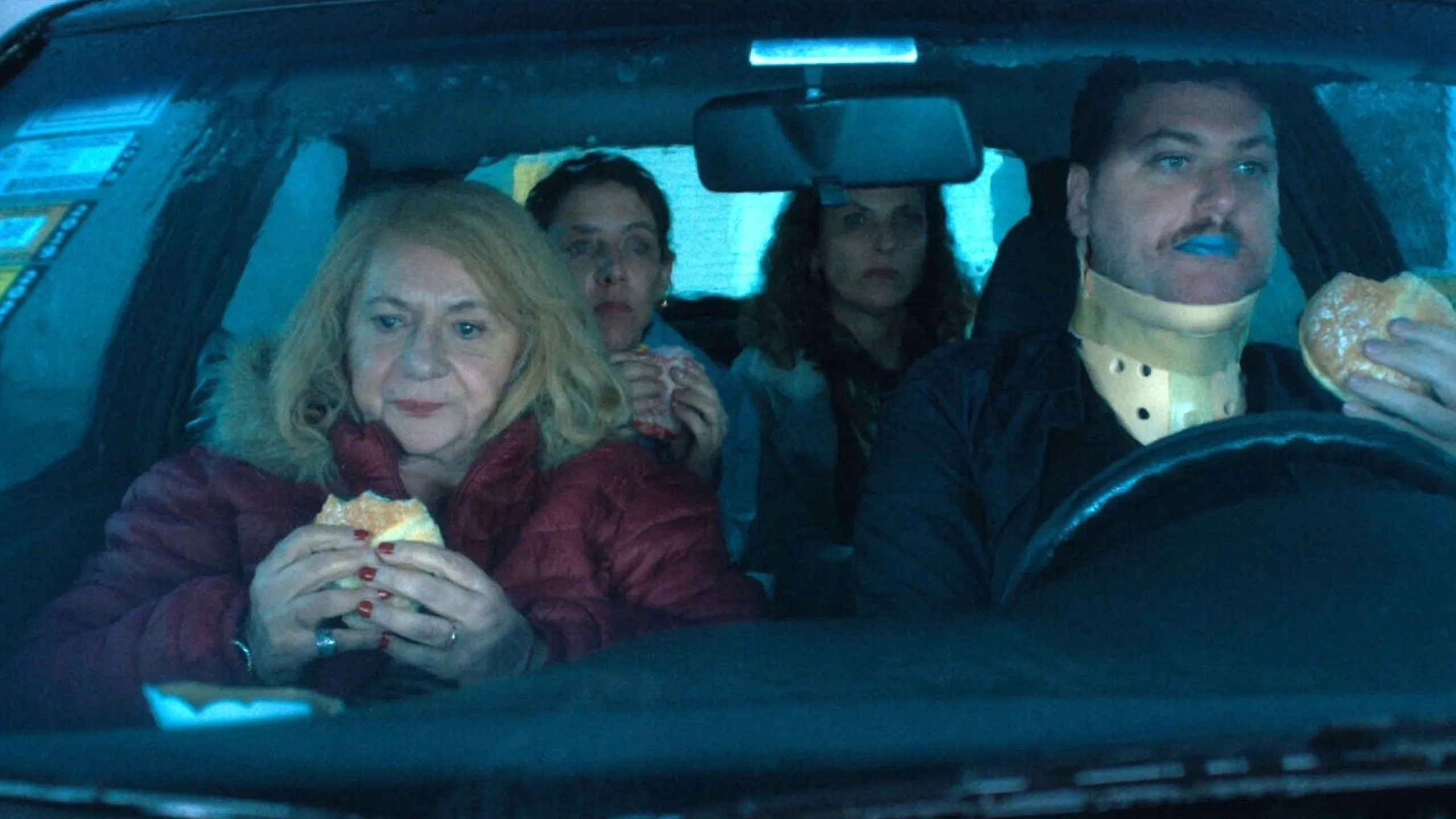A man is crying on a hotel floor. This is our introduction to David in Iair Said’s Most People Die on Sundays, an entrance not of strength but of complete dissolution. The scene is uncomfortable, stripped of cinematic vanity, presenting a portrait of a man coming undone.
David is an academic, a gay Jewish man in his thirties, and he is returning to the gravitational pull of his hometown, Buenos Aires. He arrives under the twin shadows of a recent, gutting breakup and the more formal mourning required for his uncle’s funeral.
The film establishes its tragicomic credentials from these first moments. Here is a character whose profound personal grief must be packed away, quite literally, to make room for the communal, ritualized grief of family. His return is not a hero’s journey; it is the reluctant retreat of a satellite pulled back into an orbit he thought he had escaped, forced to confront the messy, unresolved celestial mechanics of home.
The Crucible of Kin
David’s personal stasis is immediately thrown into sharp relief by the kinetic, anxious energy of his family. He re-enters a domestic ecosystem populated by formidable women: his mother Dora, a figure of gruff, pragmatic affection; his sister Elisa, a bastion of loving control; and his aunt Silvia, who offers flashes of spontaneity. Their interactions are a masterclass in familial subtext.
The dialogue is a thicket of quotidian concerns—the price of goods, David’s failure to secure a driver’s license, frequent and piercing remarks on his weight—that serve as proxies for deeper anxieties. Their bickering is not a sign of affection’s absence; it is the very language of their intimacy.
In one scene, a family Seder becomes a theater for these dynamics, a space where sacred rituals and petty grievances occupy the same breath. Rita Cortese’s performance as Dora is the film’s anchor, a magnetic depiction of a mother whose fortitude is both her shield and her burden.
Looming over them all is the silent, central void of David’s father, Bernardo, alive only through the hum of hospital machinery. Dora’s intention to pull the plug is the quiet tremor that threatens to destabilize their entire world.
The Clumsiness of Desire
Isolated within his own family, David embarks on a series of misguided quests for external validation. His deep loneliness manifests in a sequence of clumsy, nearly farcical attempts at connection. These are less seductions and more like desperate existential auditions.
He makes a clumsy pass at his driving instructor; he locks himself out of his mother’s apartment in his underwear to engineer a meeting with a handsome neighbor; he trails a doctor into a hospital bathroom. These episodes are not merely for comic effect.
They are the painful gestures of a man testing his own reality, seeking any proof that he is still a tangible, desirable object in the world. This is the heart of his arrested development. Iair Said’s own performance as David is a study in affective lethargy.
His face is a deadpan mask, his movements listless. This choice rejects easy emotional access, forcing the viewer to confront the character’s persistent, quiet malaise. There are no grand outbursts, only self-destructive acts, like an evening out that leaves him with smeared blue lipstick—a comic, pathetic symbol of a failed attempt to wear a different, happier identity.
The Body as Ledger
The film brings its threads together not with a dramatic climax, but with a quiet, physical accounting. The emotional turmoil that David and Dora cannot fully articulate begins to write itself onto their bodies. A car crash leaves David with an injured neck; Dora suffers a sprained ankle.
Their bodies become the final, honest ledger for their inner brokenness. This choice is emblematic of the film’s restrained, naturalistic style, which finds its truth in the small authenticity of life, not in manufactured melodrama. David’s eventual visit to his father’s bedside is stripped of grand catharsis. It is a quiet, unmonumental moment of acceptance.
The film’s most potent statement may be its refusal to offer a neat resolution. David is not “cured” of his sadness or his listlessness. He is simply un-stuck. The story proposes that moving forward is often the only available grace, a small, humane act of continuing. It is a look at the difficult, necessary work of processing loss and finding the support required to begin again.
Most People Die on Sundays premiered in the ACID sidebar at the 2024 Cannes Film Festival and had a limited U.S. theatrical release on May 2, 2025.
Full Credits
Director: Iair Said
Writers: Iair Said
Producers and Executive Producers: Nicolás Avruj
Cast: Iair Said, Rita Cortese, Antonia Zegers, Juliana Gattas
Director of Photography (Cinematographer): Giovanni Cimarosti
Editors: Flor Efrón
Composer: Franz Ascari
The Review
Most People Die On Sundays
Most People Die on Sundays is a quiet, intelligent study of personal and familial stasis. It exchanges narrative momentum for an unflinching authenticity, presenting a portrait of grief that is messy, undramatic, and deeply human. While its intentionally muted tone and the protagonist's passivity may distance some viewers, the film's strength lies in its refusal of easy catharsis. It is a thoughtful, sourly funny, and humane piece of filmmaking that finds profound truth in the small, awkward moments of a life paused.
PROS
- An authentic and sharply observed portrayal of complex family dynamics.
- A magnetic, lived-in lead performance from Rita Cortese as the mother, Dora.
- Its honest, unflattering depiction of loneliness and the clumsiness of grief.
- A restrained, naturalistic style that intelligently avoids melodrama.
CONS
- The deliberately slow pace and muted tone may feel sluggish.
- Its slim, character-focused story lacks significant plot development.
- The protagonist’s persistent passivity can be a challenge for the viewer.
